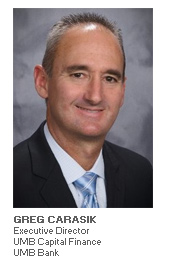
In this installment of our series of “Executive’s Corner,” featuring articles from guest writer Charlie Perer of SG Credit Partners, the author sits with Greg Carasik, Executive Director of Capital Finance at UMB Bank, to understand his views on leadership, transforming UMB’s ABL group (formerly Marquette Business Credit), portfolio management and competitive environment, among other things.
Charlie Perer: Thank you for your time Greg. To begin, can you please talk about briefly about your background?
Greg Carasik:I have been working in the ABL space in various leadership capacities for more than 25 years. I spent the first 15 years of my career exclusively on the portfolio management side of the business with the balance covering all aspects of the business. I have been afforded the opportunity to work for companies in both the regulated and non-regulated environments, which has provided great perspective as we navigate today’s competitive ABL landscape.
Perer: Marquette Business Credit re-branded and restructured under the UMB Capital Finance umbrella, and you were promoted to run it. Can you please tell us about the new structure?

Carasik: Marquette Business Credit was purchased by UMB Bank in June 2015 and the group maintained the Marquette brand to prevent any disruption in the marketplace. We collectively decided in early 2019 to rebrand ourselves under UMB and simultaneously created a UMB Capital Finance platform to house our ABL, Factoring and Capital Corporation channels. The idea around UMB Capital Finance is to drive the natural synergies that exist between the channels as customers move through their life cycle of borrowing needs. We have a unique opportunity with our UMB Capital Corporation channel, which can provide minority equity and mezzanine debt, to truly satisfy the entire capital structure for our middle-market clients.
Perer: Tell us about your new role.
Carasik: In my new role, I will continue to lead the ABL channel within UMB Capital Finance, but will also now have direct responsibility for the UMB Capital Corporation channel. The decision to put Capital Corporation under my leadership was due to the natural synergies that exist and develop with our ABL clients as needs arise for non-amortizing growth capital or equity.
Perer: How big is UMB bank and where does ABL fit into its strategy?
Carasik: UMB is a $24 billion bank headquartered in Kansas City with banking offices in eight states. They were always missing a national ABL and factoring business to round out the borrowing life cycle for their clients, which is why the acquisition of Marquette in 2015 was a perfect fit. Like most banking institutions that are looking to maintain loan yields, the ABL group is an important contributor to achieving those long-term yield goals. UMB Bank has provided the ABL group all the necessary tools to grow the portfolio, so it is incumbent upon us to grow our portfolio in the right way.
Perer: What is your strategy and what is your team’s competitive advantage?
Carasik: Being acquired by UMB Bank has afforded our ABL group the flexibility to compete on a broad profile of ABL transactions based on price, structure and size. We have the internal expertise to properly manage a company in the early stage of a turnaround, the pricing power to attract and retain a strong performing client, and the trust of UMB senior management to allow us work through difficult credits. Under our current structure, we are able to really compete with both the bank ABL shops as well as the non-bank ABL groups.
Perer: Where do you see the biggest opportunity in the market today and also as we head into the next downturn?
Carasik: It’s no secret that the current marketplace is hyper-competitive, and you need to attempt to find your spots. UMB Capital Finance continues to avoid competing in the low-yield refinance market, and instead looks for more complicated transactions or companies that have experienced an event that has forced them to seek new alternative financing. Given the very senior staff within our ABL group, we are in a position to handle and tolerate the tougher credits in order to get the transaction funded, but also to not overreact when the business does not perform as expected. As far as a downturn is concerned, we are certainly well-positioned with our senior level staff to handle any stress in our portfolio, and, of course, would view a downturn as an opportunity for additional ABL prospects.
Perer: How is your team preparing for the next downturn and does having the bank as a partner help them by utilizing your group to transfer clients rather than exit them?
Carasik: Like most true ABL shops, we perform the daily blocking and tackling as part of our routine disciplines, which readies the business to handle portfolio stress from a slowing economy. We have worked closely with the UMB commercial team over the last four years to help them understand our expertise and have developed a clear strategy to move transactions back and forth between lines of business. Our expectation is that in an economic downturn, the ABL group would be an outlet for stressed C&I loans, which is an option UMB did not have prior to the acquisition of our group in 2015.
Perer: How many banks and ABLs do you see getting flat-footed by not cleaning their portfolios in time?
Carasik: I think the flat-footedness is going to be the banks that have stretched on loan structure without proportionately increasing the monitoring of those loans. Early detection is key to minimizing loan loss and without tight monitoring tools, deteriorating collateral or financial performance will be a surprise to those institutions.
Perer: You have a strong career as a portfolio manager. How has that shaped your views in terms of managing an ABL business?
Carasik: Although I’m certain my BDO staff would rather have a pure sales person running the business, lending in this current low-yield environment has made it more important to minimize loan losses through strong portfolio management in order to achieve budgeted results. Margins have continued to erode, and the only way to offset some of that is to minimize loan losses. Taking a large charge off in the portfolio requires a considerable amount of new funds employed to offset the P&L impact given the lower yield environment. We have built a very versatile portfolio management team with strong workout skills and the ability to do it with a customer-centric approach in mind. This approach is more art than science and something I have instilled in all of our client managers.
Perer: How has the ABL business changed the past decade?
Carasik: Over the last decade, ABL businesses have had to move away from exclusively lending against traditional collateral to having a much broader lens that includes cash flow lending and non-traditional asset classes. With this change, we have needed to educate our portfolio management teams as well as our internal credit committees. The results are that ABL lending continues to consume more of the total capital structure of our clients, which has impacted the second lien lenders in a meaningful way.
Perer: You have been at a number of high-profile ABL shops throughout your career. What is it about the good ones that makes them so successful and how are you applying that to your team?
Carasik: The shops that seem to have good and consistent success are those that do not deviate in their credit profile/appetite. Customers and referral sources alike need to have some level of expectations. In addition, the types of transactions you choose to pursue in the marketplace need to mirror your portfolio management capabilities. Certain bank-owned ABL shops have decided to stretch their credit appetite without recognizing they do not have the personnel to manage those types of loans. We were very fortunate to be acquired by UMB Bank, as they have allowed our credit appetite to remain intact, provided us higher credit limit capacity and of course better cost of funds. Another important aspect to a successful ABL shop is the internal support to maintain the loans in their portfolio even if they are moving toward some type of insolvency proceeding. If you have structured your portfolio management team properly, you are far better suited to manage the workout within the ABL group than moving it to a bank workout group where too much history does not translate.
Perer: Lastly, tell us something you are worried about that the rest of the market has yet to figure out.
Carasik: Over the last 150 days or so, we have begun to see some portfolio stress which appears to be driven by the continued realignment from the tariffs’ impact and volume reductions due to our client’s customer focusing on inventory turns. We are closely watching the management teams that continue to operate in a business-as-usual manner and we have introduced more consultants to our customers in the last 120 days than we have over the last 10 years in an attempt to help them and us manage through the changing environment. Our best long-term clients continue to be those we keep a watchful eye on and look for areas to help them better manage their business through questioning them in a strategic way.